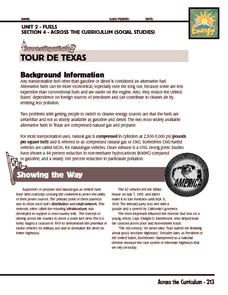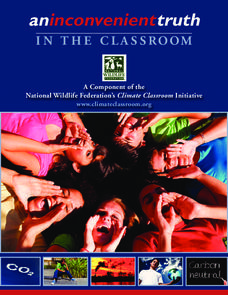Ford's Theatre
How Perspective Shapes Understanding of History
The Boston Massacre may be an iconic event in American history, but perhaps the British soldiers had another point of view. Using primary sources, including reports from Boston newspapers and secondary sources from the British...
Smithsonian Institution
POWs
Why did Vietnam POWs and their families receive more media attention than POWs in previous wars? To answer this question, class members view artifacts, read articles, and engage in class discussion. Individuals then assume the voice of...
University of Texas
Understanding Migration
Human migration—often the result of push and pull factors—sometimes has dramatic outcomes for both those leaving their homelands and the host countries. Using a variety of case studies, learners consider those issues. Then, by completing...
Cornell University
Fibers, Dyes, and the Environment
Nanofibers can be made through electrospinning or force spinning in order to reduce the negative impact on the environment. Pupils study the role of fibers and dye on the environment through a series of five hands-on activities. Then,...
Benjamin Franklin Tercentenary
Franklin’s Fair Hand American Journalism
Scholars know him for his role in the American Revolution, but Ben Franklin was also a journalist and printer. Learners investigate his standards for what was fit to print using primary sources—including writings where Franklin explains...
abcteach
Snow Similes
The snowflakes were like diamonds, glittering on the ground and in the sky. Encourage your pupils to write their own snow-related similes with a quick exercise. Pupils write five similes and illustrate their favorite comparison.
NOAA
Understanding El Niño Using Data in the Classroom
Are weather troubles caused by El Nino? An installment of a larger series presents a five-part lesson on El Nino. First, scholars learn to read sea surface temperature maps. Then, they compare them to data on graphs before determining if...
Texas State Energy Conservation Office
Investigation: Tour de Texas
Teams of Texas tourists gather into groups to analyze what they can do with $50 worth of an alternative fuel. They write checks, keep a balance sheet, and map out their sight-seeing route taking into consideration the location of...
Global Oneness Project
A Day in the Life
We often see other countries depicted in movies, but getting a close look at a typical day in the life of a young person from another country isn't as common. Give your pupils such a look with a resource that helps class members explore,...
Global Oneness Project
A Collapsing City Skyline
Have your high schoolers learn about the modern history of Myanmar by close-reading an article about the city and people of the city Yangon. As they'll learn, the country is going through some dramatic transitions. After reading the...
National Endowment for the Humanities
A Journalist’s Report: The Better Vision for Black Americans
After reading a series of primary source documents detailing the teachings of Martin Luther King, Jr. and Malcolm X, class members craft newspaper columns assessing the strengths and weaknesses of each man's vision, and present their...
Library of Congress
The Harlem Renaissance
The Harlem Renaissance brought forth many American art forms including jazz, and the writings of Zora Neale Hurston and Langston Hughes. Using a carefully curated set of documents from the Library of Congress, pupils see the cultural...
Cuban Revolution
The Cuban Revolution and Its Impact on Latin America
Fidel Castro was the iconic leader of Cuba. Yet, individuals may know little about the man or his motivations. In an engaging Web quest activity, scholars investigate Castro's political aspirations and his more ephemeral personal life...
WindWise Education
How Do You Feel About Wind Energy?
Tell me what you really think. The class reviews articles related to wind energy to see how the author uses words, phrases, and images to sway the reader. Through a class discussion, individuals share their feelings from the media...
National Wildlife Federation
An Inconvenient Truth in the Classroom
Global warming — what a hot topic! A thorough unit challenges learners to research, read, explore, and write about carbon, its role and increasing nature in our atmosphere, and how global warming is affecting lives and environments...
WindWise Education
Where Do You Put a Wind Farm?
This is not your ordinary farm! Using a case study, small groups study two proposed locations for a wind farm. After researching all the information about the sites, the groups choose a site. Each team member writes up the proposal...
Agency for Toxic Substances and Disease Registry
Don't Mess with Mercury (Lesson C)
The health effects of mercury exposure if the focus of the first of three activities about the properties of metals. Pairs research mercury to write, prepare, and share posters, articles, or PSAs with the class.
Agency for Toxic Substances and Disease Registry
Don't Mess with Mercury (Lesson A)
Mercury is the only metal that is a liquid at room temperature. Teach your class this and many more interesting mercury facts by assigning an engaging task. A public relations activity, the exercise informs pupils of the hazards of...
Cold Spring Harbor Laboratory
DNA Words Are Three Letters Long
DNA writes 64 different words but only codes for 20 different amino acids. Budding scientists learn about where each of these numbers come from and why they aren't equal with an online interactive. The resource explains the research, the...
National WWII Museum
On Leave in Paris: Maps as Primary Sources
Primary sources—even those that seem mundane—offer a window into those who experienced history. Using a Red Cross map offered to soldiers stationed in Paris after World War II alongside worksheet questions, scholars consider what life...
American Battlefield Trust
Fredericksburg 360
Urban combat long preceded today's video games. Pupils today experience the battle of Fredericksburg—a major Civil War engagement in an American city—using a 360-degree interactive app. Users explore the battlefield online, using a...
C-SPAN
Voting Discrimination and the Effects of Shelby County v. Holder
Show students that every vote counts as they debate the federal government 's role in protecting voting rights in historically racially discriminated areas. In the Supreme Court case Shelby County v. Holder, the high court found that...
National Endowment for the Humanities
American Utopia: The Architecture and History of the Suburb
Let's build a dream house! By examining promotional materials and photographs of early suburban developments, scholars consider what led to the development of this particular American dream. The resource includes case studies of three...
DocsTeach
Assimilation of American Indians
Imagine being forced to give up your culture and then being graded on how well you complied with orders to do so. Documents show young historians the price indigenous peoples paid as a result of the Dawes Act, which was essentially a...
Other popular searches
- Descriptive Writing
- Creative Writing
- Persuasive Writing
- Narrative Writing
- Letter Writing
- Essay Writing
- Writing Process
- Writing Autobiography
- Writing Technique
- Expository Writing
- Writing Fables
- Paragraph Writing

























